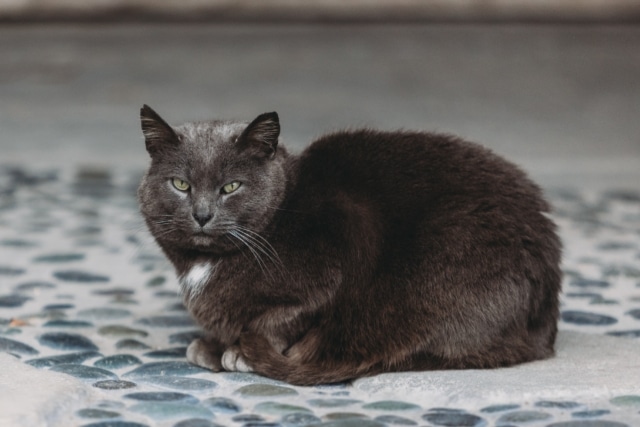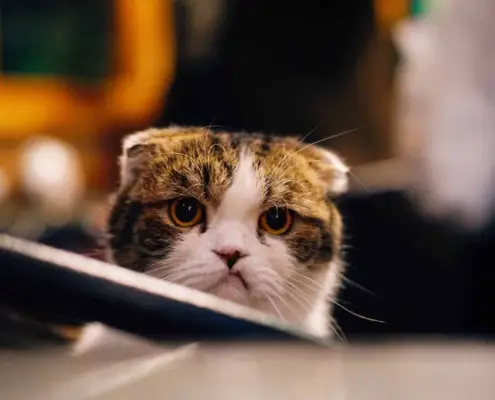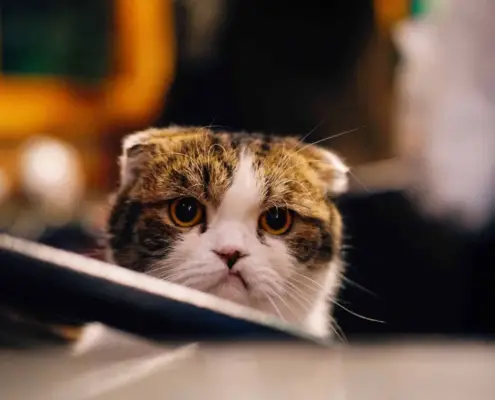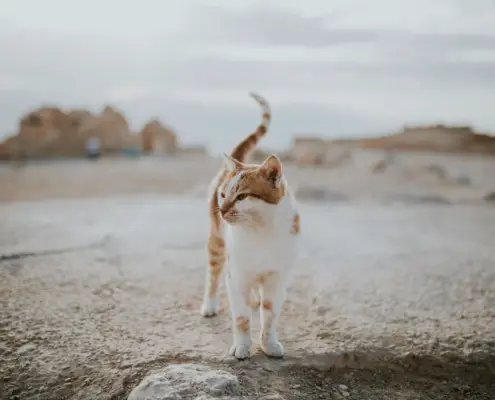
Cats, beloved pets and cherished companions, can experience a variety of eye problems. It is essential for cat owners to be aware of these issues and know how to identify them. By understanding common eye problems in cats, you can take prompt action to protect your feline friend’s vision.
One of the most prevalent eye problems in cats is conjunctivitis, also known as pink eye. This condition is characterized by redness and inflammation of the conjunctiva, the thin membrane that covers the eyeball and inner eyelid. Conjunctivitis in cats can be caused by allergies, infections, or foreign objects irritating the eye. Another common eye problem is corneal ulcers, which are superficial sores on the cornea. These ulcers can be caused by trauma, infection, or underlying medical conditions. Additionally, cats can develop cataracts, a clouding of the lens that obstructs vision. Cataracts often occur in older cats but can also be a result of genetic factors or diabetes.
Symptoms of Eye Problems in Cats
Recognizing the symptoms of eye problems in cats is crucial for early detection and treatment. Cats may exhibit various signs when experiencing eye issues. Watch out for redness, swelling, or discharge from the eyes. Excessive blinking, squinting, or pawing at the eyes can also indicate a problem. Additionally, if you notice your cat’s eyes appearing cloudy or their behavior suggests a sudden change in vision, it is essential to seek veterinary care immediately. Any changes in the appearance or behavior of your cat’s eyes should not be ignored, as they could be indicative of an underlying condition.
Causes of Eye Problems in Cats
Understanding the causes of eye problems in cats can help you prevent them and ensure your feline friend’s well-being. Allergies are a common cause of eye problems in cats. Pollen, dust, or certain food ingredients can trigger an allergic reaction, leading to eye irritation and inflammation. Infections, such as bacterial or viral conjunctivitis, can also cause eye problems in cats. Feline herpesvirus, a highly contagious virus, is a common culprit behind eye infections in cats. Trauma to the eye, such as scratches or foreign objects, can result in corneal ulcers or other complications. Additionally, underlying health conditions like diabetes or hypertension can contribute to the development of eye problems in cats.
When to Seek Veterinary Care for Your Cat’s Eye Problems
If you suspect your cat is experiencing eye problems, it is essential to seek veterinary care promptly. Some eye problems can worsen rapidly if left untreated, potentially leading to permanent vision loss or other complications. Contact your veterinarian if your cat’s eye problems persist for more than a day or if the symptoms worsen. Additionally, if your cat exhibits signs of severe pain, such as excessive pawing at the eyes or avoiding light, immediate veterinary attention is necessary. Remember, it is always better to err on the side of caution when it comes to your cat’s eye health.
Diagnosing Eye Problems in Cats
Diagnosing eye problems in cats requires a comprehensive examination by a veterinarian. Your veterinarian will perform a thorough evaluation of your cat’s eyes, looking for any signs of infection, inflammation, or trauma. They may also conduct specific tests, such as staining the cornea to detect ulcers or measuring the intraocular pressure to rule out glaucoma. In some cases, your veterinarian may refer you to a veterinary ophthalmologist for further evaluation and specialized care. An accurate diagnosis is crucial for determining the most appropriate treatment plan for your cat’s eye problems.
Treating Common Eye Problems in Cats
Treatment for eye problems in cats depends on the specific condition and its underlying cause. In cases of conjunctivitis, your veterinarian may prescribe eye drops or ointments to alleviate inflammation and combat infection. Corneal ulcers often require medication, such as topical antibiotics or antifungal agents, to promote healing. If cataracts are diagnosed, surgical intervention may be necessary to restore your cat’s vision. It is important to follow your veterinarian’s instructions carefully and administer all prescribed medications as directed. Regular recheck appointments are also vital to monitor your cat’s progress and ensure the effectiveness of the treatment.
Preventing Eye Problems in Cats
While not all eye problems can be prevented, there are steps you can take to minimize the risk and protect your cat’s vision. Regular veterinary check-ups are crucial for early detection of any underlying health conditions that could impact your cat’s eye health. Maintaining a clean living environment, free from dust and irritants, can help prevent allergic reactions. Ensuring your cat receives a balanced diet and maintaining their overall health can also contribute to their eye health. Additionally, keeping your cat’s living space free from hazardous objects and providing ample opportunities for exercise can help reduce the risk of trauma to the eyes.
Tips for Maintaining Your Cat’s Eye Health
In addition to preventive measures, there are several tips you can follow to maintain your cat’s eye health. Regularly inspect your cat’s eyes for any signs of redness, discharge, or cloudiness. Keep their eyes clean by gently wiping away any debris with a damp, clean cloth. Avoid using any harsh chemicals or products near your cat’s eyes unless recommended by your veterinarian. Lastly, provide your cat with a balanced diet rich in essential nutrients, including omega-3 fatty acids, which promote eye health.
Eye Care Products for Cats
There are various eye care products available specifically designed for cats. These products can help maintain your cat’s eye health and prevent certain eye problems. Eye drops or ointments, prescribed by your veterinarian, can be used to treat specific eye conditions. Additionally, there are over-the-counter products, such as eye wipes or tear stain removers, that can assist in keeping your cat’s eyes clean and free from irritants. However, always consult with your veterinarian before using any new products on your cat’s eyes to ensure their safety and efficacy.
Conclusion
Protecting your feline friend’s vision is of utmost importance as a responsible cat owner. By familiarizing yourself with common eye problems in cats, recognizing their symptoms, and understanding their causes, you can take proactive steps to ensure your cat’s eye health. Prompt veterinary care, accurate diagnosis, and appropriate treatment are crucial in preserving your cat’s vision. By following preventive measures, maintaining regular check-ups, and implementing proper eye care practices, you can help safeguard your cat’s precious eyesight. Remember, a vigilant eye for your cat’s eye health can make all the difference in their overall well-being.
Schedule a veterinary check-up for your cat today to ensure their eye health is in optimal condition. Contact your veterinarian for an appointment.
If you enjoyed my article, I would appreciate you sharing it with your network.

Sima Ndlebe
Sima writes for CatBuzz. He is interested in Cats, Health and Fitness, and Entrepreneurship.
Published: 12 October 2023
Related Articles
Disclaimer
The content found on CatBuzz.org is presented on an "as is" basis and is intended for general consumer information and education purposes only. Any utilization of this information is voluntary and solely at the user's own risk.
None of the articles or content should be regarded as, or used in place of, veterinary medical advice, diagnosis, or treatment. The information provided on the website is purely for educational and informational intentions and should not be considered a substitute for professional guidance from a veterinarian or other qualified expert. The articles are designed to inform consumers about veterinary healthcare and medical matters that may impact their cat's daily life. It should be noted that this website and its services do not constitute the practice of any form of veterinary medical advice, diagnosis, or treatment. CatBuzz.org explicitly disclaims any liability for any direct or indirect damages or losses that may arise from the use of or reliance on the information contained within the content.
Consumers must consult a veterinarian, veterinary specialist, or another qualified veterinary healthcare provider when seeking advice regarding their cat's health or medical conditions. It is important not to ignore, avoid, or postpone seeking medical advice from a veterinarian or other qualified veterinary healthcare provider solely based on information obtained from this website. If you believe that your cat may be experiencing a medical issue or condition, it is imperative to promptly contact a qualified veterinary healthcare professional.



